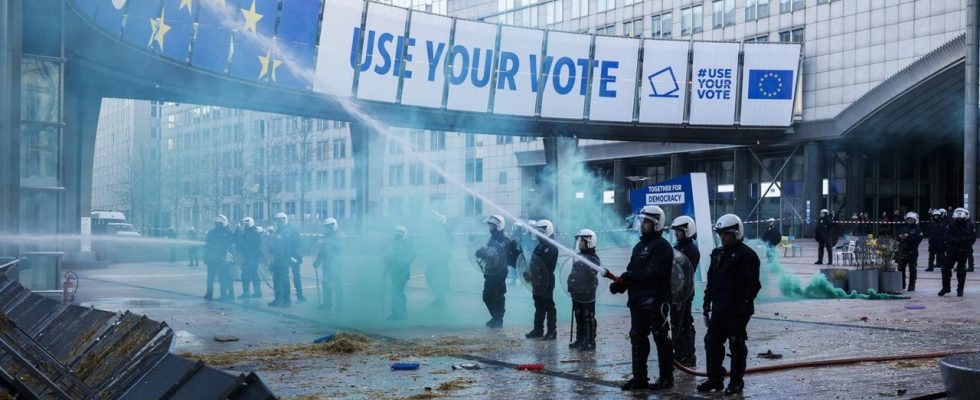european magazine
In the European elections in June, there are signs of major gains for parties that are considered critical of the EU. In the election campaign, they exploit people’s concerns and fears – with success, even though these are not always justified.
Susi Dennison prefers to avoid personal assessments. The expert from the think tank European Council on Foreign Relations (ECFR) prefers to stick to numbers and statistics. But looking at the mood shortly before the European elections, she admits to being worried. Europe’s citizens are unsettled after years of crisis: first the financial crisis, then Corona, now the war against Ukraine. Many people have the feeling that the big decisions are made without them, says Dennison – and people no longer want to accept that.
A current study by the ECFR suggests that this could be reflected in a particularly large number of protest votes in the European elections. In a third of all EU countries, Eurosceptic forces could end up in first place, and in another third they could end up in second place. This would mean that they would perform stronger than ever before in a European election.
More EU skeptics than ever in Belgium
The think tank has calculated how high the potential voters for Eurosceptics now are in the individual countries. It has increased almost everywhere since the last European elections in 2019. In Germany, for example, approval has doubled to 26 percent – the majority of which goes to the AfD.
In Austria, the voter potential of Eurosceptic parties is already 30 percent, in France it is 42 percent. In Hungary and Poland the values have recently fallen, but are still over 50 percent.
Support has increased most strongly in Belgium: There, Eurosceptic forces now have 60 percent of the vote. Both left and right Eurosceptic parties are taken into account in the calculation – in Belgium, for example, Flemish nationalist forces, but also the communists.
Legal and left-wing populist Forces
Because it is a fallacy that criticism of Europe automatically has to be right-wing, says Paul Schmidt from the Austrian Society for European Policy. Extreme nationalism is a characteristic of right-wing parties. However, a stronger demarcation against Europe has long been found in all shades of the political spectrum and is having an impact on the moderate center. Europe is often made a scapegoat, especially when it comes to hot topics, says Schmidt: “As if we weren’t there when decisions were made.”
The result: Many people are no longer sure whether their country’s EU membership is beneficial. In Germany it is currently only 68 percent, according to the current Eurobarometer. Compared to the EU, this is still in the upper middle range – in other countries, not even half are still convinced of EU membership. The image is worst in Austria.
That doesn’t mean that more than half of those surveyed fundamentally reject the EU, says Schmidt. But at least they would have doubts about whether Europe’s institutions are up to major challenges.
Is it your own fault for disappointed expectations?
The Eurobarometer also determined which problems people expect more from Europe. Four main concerns are cited across Europe: inflation, the international security situation, migration and the climate.
However, there are strong local differences: in Germany and the Netherlands, migration plays an above-average role, while in Sweden, concern about the climate is more than twice as great as the EU average.
Issues for which there are no quick solutions, says Schmidt. But that is exactly what EU policy often suggests. Brussels is partly to blame for the bad image: “Expectations are raised that are not met. And that of course leads to a certain potential for frustration and disappointment.”
Hardly any party wants the exit anymore
Critics of Europe are fueling this mood. However, only a few are now calling for their country to leave the EU. This has been unpopular since Brexit; apart from the Dutchman Geert Wilders, hardly any party in Europe is calling for an open break.
The AfD also did not have a “Dexit” in its European election program, although it was repeatedly discussed internally. In the meantime, however, people would rather focus on restructuring the EU from within. Most Eurosceptic movements rely on stronger nation states.
Susi Dennison calculated what this means for the Paris office of the ECFR: Up to 37 percent of the seats in the next EU Parliament could go to critics of Europe. Enough to hinder common solutions. But her biggest concern is not the rise of populists, says the pollster. Rather, the progressive forces are doing less and less to oppose this. Disappointed voters would then rely on the extremists due to a lack of alternatives. And that is “frustrating and worrying” – but not particularly surprising.
You can see these and other reports on March 24th, 2024 at 12:45 p.m. in the “Europamagazin”.

